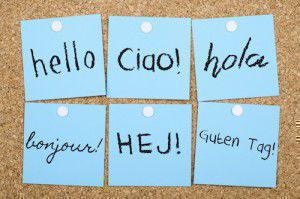A Language Journey
Today we’ve got a fantastic guest post from Kelly Wang – English teacher, accidental traveller, cake whisperer, dinosaur believer – on her personal language learning journey.
If you’ve got a language story to tell, we’d love to hear it! Now over to you, Kelly…
My journey through languages began in sequins and shoulder pads.
At the age of seven I remember clutching a Pot Noodle (Chow Mein flavour, if you must know), with an A4 pad in front of me and one of those 10 coloured pens ready and poised, waiting for the Eurovision Song Contest.
It has long been a tradition in my family to watch the Eurovision together, and to give marks out of ten to the acts. And at that age, I was of the opinion that English was the only language in the world, so my marking scheme would include whether or not the songs were in English. No English? Nil points.
I even took exception to the fact that each country when giving their own points spoke in their own language. How rude.
Fast forward to the last year of primary school and we learnt a few French words like bonjour and le livre and la fenêtre.
I still thought English was the best language.
But then, on reaching secondary school, when we started to learn a ‘modern foreign language’ regularly (in my case, French), I loved it. I loved the idea of being able to speak to everyone, no matter the language. And better than that, I was picking it up pretty easily.
The following year there was a repeat performance with learning German, and I remember a sort of teenage arrogance of thinking that languages were going to be ‘my thing’, because by the time I was sixteen I could also say Θέλω να πάω σπίτι in Greek – Thélo̱ na páo̱ spíti (I want to go home).
Over the years I’ve flirted with a lot of languages. I tried Chinese for a while, but with the complicated tonation, I was more worried about causing offence with the way I said a word, and less worried about actually stringing a sentence together.
And then, I found my true language love. The one language I could lose myself in and spend hours learning just for fun. The one language I would squeal over if I heard it spoken in public. Which is Finnish. Naturally.
Finnish may sound like an odd choice, but it made perfect sense to me. What started with a passing interest listening to Finnish metal music erupted into a bit of an obsession when I found myself frustrated that I couldn’t understand the Finnish ice hockey commentary.
For almost two years, Finnish became my number one hobby. Being relatively self-disciplined when it comes to studies, I decided to learn through a mix of self study and online language exchanges. Many an adventure was had along the way, and that perhaps is a story for another time, but I loved it. No prepositions to learn because everything was a suffix, and by changing the word ending you could say a whole range of things about it: saunassa, saunasta, saunan (in the sauna, from the sauna, for the sauna). No articles, no need to wonder if your table was a girl and your chair was a boy, it didn’t matter. Neither did you have to refer to a person as he or she, one simple han and it was covered! Beautiful.
Fast forward another year, and I found myself attempting to get to grips with Hungarian. Now for those of you who don’t know, Finnish and Hungarian are cousins of the language world, and it depends on which scholar you speak to as to how close a family they are. My experience was that whilst it sounded an awful lot like Finnish, Hungarian was nothing like it at all, except for the odd words like toilet: Hungarian – vécé, Finnish vessa.
And currently, I find myself in Spain. Adamantly not learning the language.
Because the problem now, with being a ‘jack of all trades, master of none’ when it comes to language, is that they all get tangled up. A waiter asks me if I want a refill, I answer in a mix of Spanish and Hungarian. I overhear staff in my local Chinese supermarket and confuse them – and myself – by responding in Chinese rather than Spanish. And recently on a stopover in Paris, I managed to respond to questions in French but found myself asking questions in Finnish.
What I really could do with is a babel fish. Or to live in the TARDIS. Unfortunately, I am in the wrong reality for that. But. I still love languages.
So. I don’t know what the foreign language for me is going to be. Should I return to French, attempt to master Finnish, or take up something new like Dothraki? Or will that lead to more unnecessary tongue twisting? I just don’t know. Would you like to join me on my journey?
Kelly
Why I’m learning Icelandic in January
When Liz asked us if we’d be interested in signing up for her January challenge to learn a language with uTalk, I immediately knew which language I was going to pick: Icelandic. Then she asked me why and I struggled: I don’t have a good reason. I have never been to Iceland, I don’t have any Icelandic friends and, realistically, I’m unlikely to need to speak Icelandic in the near (or even distant) future.
And yet I am incredibly excited about the prospect of cramming as much Icelandic as possible into my mince-pie stuffed head in January, and trying to beat all my colleagues in the challenge. Ever since recording uTalk Icelandic with our genuinely lovely and professional voice artists Saga and Smarri, I have wanted to know more about the language and culture of this beautiful country of Northern lights, roaming wales and unfailingly excellent Eurovision entries.
I’m also a bit of a fan of the Nordic sagas and the idea of being able to vaguely decipher the genuine article with some of my newly acquired Icelandic really appeals. That’s probably a bit ambitious for January, but it never hurts to have a long-term goal, and I’m hoping that the uTalk challenge will start me off on a serious 2015 language quest.
Who else is going to join us?
Nat
What’s so good about Eurovision?
This Saturday is the final of the Eurovision Song Contest 2014 in Denmark, with 125 million people expected to watch across Europe and beyond. The contest, now in its 59th year, has become known for its wacky performances and tends to divide opinion; while some people love it (although maybe not as much as this man), others claim to find it tacky. But I think most people can agree that whether you take it seriously or not, Eurovision is good fun. (Even if sometimes you need a drink or two to help you through it.) Here are our ten favourite things about Eurovision:
1. Russian Grannies
I had to put this first because it was one of my favourite ever Eurovision moments. The song on its own is fairly forgettable, but what made it amazing was the elderly ladies who managed to incorporate baking into their performance at the 2012 contest. I’m still not sure what it had to do with a Party for Everybody, but it was brilliant, and I’m still disappointed that it didn’t win.
2. Riverdance
The Irish dance act were first discovered when they performed during the interval of the Eurovision Song Contest in 1994. Known for its amazing synchronicity, energy and rhythm, Riverdance went on to become a worldwide phenomenon. So if you’re not a fan, now you know who to blame.
3. Romanian rivalries
In the UK, it’s not seen as very ‘cool’ to enjoy Eurovision, but some other countries take it incredibly seriously. In Romania, for example, it’s a really big deal and apparently it’s traditional for the acts to try and win a place by discrediting their opponents.
4. The voting
How could I not mention the political voting? Half the fun of Eurovision is predicting who’s going to give points to who. Greece and Cyprus usually vote for each other, as do the Scandinavian countries and the Balkans. If that sort of thing interests you, this is a useful summary. Unfortunately, the political voting tends to leave the UK in a precarious position; we often get votes from Ireland, and sometimes Malta, but not very often from anyone else…
5. The UK
While we’re on the subject, let’s take a look at the UK’s Eurovision record. It’s hard to believe looking at recent history, but apparently it’s one of the most successful countries, winning five times since our first appearance in 1957. The last win was in 1997, with Katrina and the Waves, and since then we’ve not been doing so well, finishing last three times. The first of these was in 2003, when we scored an embarrassing ‘nul points’. Apparently this year’s entry, Children of the Universe, by singer-songwriter Molly, is expected to do well. I’ll believe it when I see it.
6. ABBA
It’s not often that a Eurovision act goes on to have a successful long term career, but one exception is Swedish group ABBA. Not only did they win the contest for Sweden in 1974, they went on to sell over 380 million albums worldwide. Their music also featured in the hit film Muriel’s Wedding and the award-winning musical, Mamma Mia! (And the movie version, which introduced the world to the singing ‘talents’ of Pierce Brosnan.)
7. Alcohol is Free
Regardless of your views on drinking, it’s hard not to tap your foot along to Alcohol is Free, by Koza Mostra and Agathonas Iakovidis, a.k.a. the Greek answer to Madness. They finished sixth in 2013.
8. Finland
We love Finland; they always come up with something memorable. Last year was the catchy Marry Me, which ended with that kiss, but nothing beats 2006 entry Hard Rock Hallelujah, by Lordi. Eurovision isn’t known for its heavy metal, preferring to stick to happy songs about how we should all love each other. But the alternative approach seemed to do the trick; the band won that year’s contest.
Warning: this video contains flashing lights and monster masks!
9. Language rules
Eurovision used to have a very strict rule about countries only singing in their native language, which has been lifted and restored a few times over the years. These days, many of the competing countries choose to perform in English, but some remain loyal to their own language; France and Spain are two examples. When I was growing up, there were more songs in other languages than there are today, and we used to enjoy turning on the subtitles and watching them struggle to translate the lyrics. Songs in English have won 28 times, followed by French, with 14 wins.
10. Fairytale
This was a popular choice in the EuroTalk office. Every now and again, Eurovision does actually produce a good song, and Fairytale was the one that we all thought of. The Norwegian entry for 2009 featured violinist Alexander Rybak, and won with a record-breaking 387 points out of a possible 492. For some reason, Alexander and his dancers were also a bit of a hit with the ladies…
Have we left out your favourite thing about Eurovision? Let us know in the comments!
Liz


